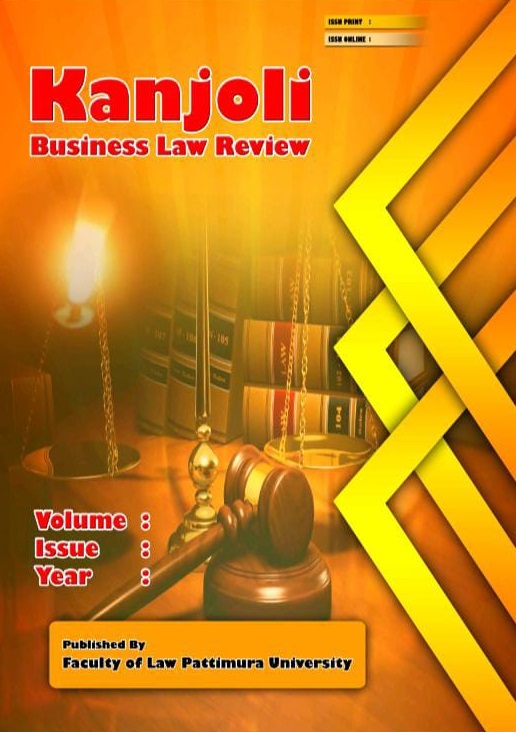Prudent Principle Dalam Penyaluran Kredit Pada Layanan Digital Perbankan
Abstract
In credit distribution carried out through digital banking services, approval of credit applications and data verification are processed more quickly than if done conventionally. This gives rise to the implication that the prudent principle for providing credit or other financing has not been fully implemented and could result in losses for the bank and the Debtor Customer if it continues if the prudent principle is not implemented properly. The aim of this research is to review and discuss the application of the Prudent Principle in the procedure of acquiring credit through digital banking services as well as whether the digital procedure to acquire credit could provide protection for the parties. The legal research method used for this research is based on primary, secondary, and tertiary legal materials, and uses a statutory approach and a conceptual approach. The results of the research show that the prudent principle must be implemented effectively to determine whether the prospective Debtor Customer can be trusted and is able to make payments so that both parties do not experience losses. How quickly the approval of credit applications made through digital banking services shows that the implementation of prudent principles has not been implemented properly when compared to credit applications made conventionally. Legal protection for the parties involved can be implemented by using relevant laws and regulations as a form of preventive legal protection. There is also repressive legal protection in the form of alternative dispute resolution or through civil lawsuits in court.
Downloads
References
Abdulkadir, Muhammad, dan Rilda Murniati. Segi Hukum Lembaga Keuangan dan Pembiayaan. Bandung: PT. Citra Aditya Bakti, 2004.
Abdullah, Thamrin, dan Sintha Wahjusaputri. Bank dan Lembaga Keuangan. Kedua. Jakarta: Mitra Wacana Media, 2018.
Gazali, Djoni S., dan Rachmadi Usman. Hukum Perbankan. Jakarta: Sinar Grafika, 2012.
Hasan, Djuhaendah. Lembaga Jaminan Kebendaan Bagi Tanah Dan Benda Lain Yang Melekat Pada Tanah Dalam Konsepsi Penerapan Asas Pemisahan Horisontal. Bandung: Citra Aditya Bakti, t.t.
Hermansyah. Hukum Perbankan Nasional Indonesia. Kedua. Jakarta: Prenada Media Group, 2005.
Joyosumarno, Subarjo. “Upaya-upaya Kreditur Indonesia dan Perbankan dalam Menyelesaikan Kredit Bermasalah.” Majalah Pengembangan Perbankan, edisi, no. 47 (1994).
Kuahaty, Sarah Selfina. “Perjanjian Lisensi Sebagai Bentuk Perlindungan Merek.” Sasi 21, no. 1 (2015): 65–73.
M Bahsan SH, S. E. Hukum Jaminan dan Jaminan Kredit Perbankan Indonesia. Rajawali pers, 2020.
Mahesa, Bagas Tri. “Keabsahan Perjanjian Elektronik Penyedia Layanan Uang Digital:(Studi Kasus Hilangnya Uang Di Aplikasi Dana).” Journal Sains Student Research 1, no. 1 (2023): 1087–93.
Mahmud Marzuki, Peter. Penelitian Hukum. Jakarta: Kencana Pranada Media, 2005.
Muhammad, Djumhana. Hukum perbankan di Indonesia. Edisi Keenam. Bandung: Citra Aditya Bakti, 2012.
N. Idroes, Ferry. Manajemen Risiko Perbankan: Pemahaman Pendekatan 3 Pilar Kesepakatan Basel II Terkait Aplikasi Regulasi dan Pelaksanaannya di Indonesia. Jakarta: Rajawali Press, 2008.
Saroinsong, Andrew N. “Fungsi bank dalam sistem penyaluran kredit perbankan.” Lex Privatum 2, no. 3 (2014). https://ejournal.unsrat.ac.id/index.php/lexprivatum/article/view/6166.
Sjahdeini, Sutan Remy. “Kebebasan berkontrak dan perlindungan yang seimbang bagi para pihak dalam perjanjian kredit bank di Indonesia,” 1993. https://lontar.ui.ac.id/detail?id=91393.
Susilo, Edi. Analisis Pembiayaan dan Risiko Perbankan Syariah. Yogyakarta: Pustaka Pelajar, 2017.
Sutedi, Adrian. Aspek Hukum Otoritas Jasa Keuangan. Jakarta: Raih Asa Sukses, 2014.
Tjoanda, Merry. “Prinsip Kehati-hatian Dalam Upaya Melindungi Nasabah Penyimpan Dana.” Magister Universitas Airlangga, 1998.
Tjoanda, Merry, Yosia Hetharie, Marselo Valentino Geovani Pariela, dan Ronald Fadly Sopamena. “Covid-19 sebagai Bentuk Overmacht dan Akibat Hukumnya Terhadap Pelaksanaan Perjanjian Kredit.” SASI 27, no. 1 (25 Maret 2021): 93–101. https://doi.org/10.47268/sasi.v27i1.447.
Ziqi, Liao, dan Michael Tow Cheung. “Internet-based e-banking and consumer attitudes: an empirical study.” Information & management 39, no. 4 (2002): 283–95.
Copyright (c) 2024 Siska Vilonia Indah Sopamena, Merry Tjoanda, Sarah Selfina Kuahaty (Author)

This work is licensed under a Creative Commons Attribution-NonCommercial 4.0 International License.
Authors who publish their manuscripts in this Journal agree to the following conditions:
- The copyright in each article belongs to the author, as well as the right to patent.
- Authors are able to enter into separate, additional contractual arrangements for the non-exclusive distribution of the journal's published version of the work (e.g., post it to an institutional repository or publish it in a book), with an acknowledgment of its initial publication in this journal.
- Authors are permitted and encouraged to post their work online (e.g., in institutional repositories or on their website) prior to and during the submission process, as it can lead to productive exchanges, as well as earlier and greater citation of published work.
- Authors have the right to self-archiving of the article (Author Self-Archiving Policy)











